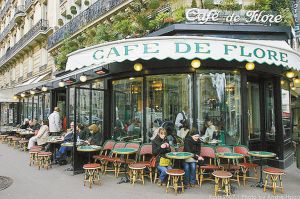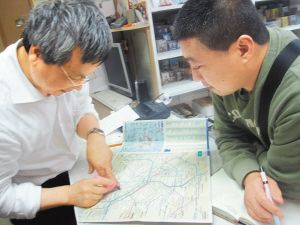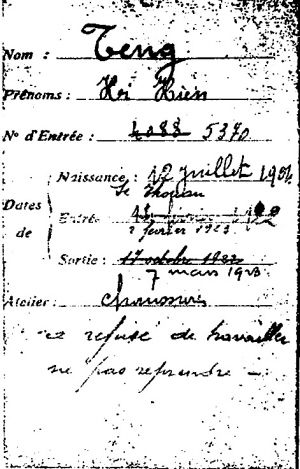The encounter between Zhou Enlai and the Cafe of Flowers in Paris

The Cafe, located at 172nd St. Germain Street in the sixth arrondissement of Paris, was built in 1887 because there was a statue of the ancient Roman goddess Flore in front of the door. (file picture)

Ye took out a map of Paris to mark the footprints of Zhou Enlai that year.
Oral history
Narrator: Ye Planet, President of the European History Society of France
In the 1920s, Zhou Enlai stayed for more than two years in a small hotel at 15 Rue Goflua, near the Italian place in the 13th arrondissement of Paris, while reading, writing articles and doing social research. In the meantime, drinking coffee in cafes became an important means for Zhou Enlai to understand society and develop social relations.
The Cafe "God of Flowers", one of the three famous cafes in Paris, opened in 1865. It is famous for receiving people from cultural and art circles and has a history of more than one hundred years. Picasso, Sartre, Breton and Trotsky, a politician, all drank coffee there.
In the 1920s, young Zhou Enlai also often went to the "Flower God" cafe near the small hotel where he lived to drink coffee and write articles. Pascal, the waiter in the shop, is cheerful, full of sympathy for those hot-blooded poor scholars, and likes to associate with them.
Zhou Enlai, a young Chinese, also became his friend. He admired the young man with black hair and yellow skin. In search of truth, he left his hometown and came to France. For a time, Zhou Enlai was short of money, and Pascal always borrowed money to help him. Zhou Enlai never forgot Pascal's friendship and help to him.
After Zhou Enlai became prime minister, he did not forget this old friend. He sent Chinese cigarettes and tea to Pascal many times, and Pascal always shared them with his colleagues every time. To this day, many people in the Flower God Cafe know that China has a very emotional prime minister. Pascal is now a thing of the past, but the Cafe God of Flowers still tells the story of his relationship with the Chinese premier. The Cafe "God of Flowers" now belongs to the cultural heritage protection unit in Paris. The shield-shaped metal plate protected by cultural relics clearly bears the name of Zhou Enlai.
In addition to the "God of Flowers" cafe, Zhou Enlai also went to the cafe near the Paris East Railway Station for coffee.
Deng Xiaoping in France: six years of hard work and study
Narrator: Ye Planet, President of the European History Society of France

Deng Xiaoping's file card at Hutchinson Rubber Factory. (file picture)
On October 22, 1920, 16-year-old Deng Xiaoping, Huang Jisheng, Deng Shaosheng and other 23 Chinese students officially registered in Bayo Middle School in Normandy under the arrangement of the "French-Chinese Education Association" and began their career in France. At that time, there was only one foreign boarding school in France that could not speak French, and the school specially opened a French course for these Chinese students.
Bayor Middle School, renovated in the 1960s, is now called Alain Sabatier Middle School. On the east side of the campus, there is an ancient three-story building, which is the former site of the Bayue school building. At present, Bayo Middle School has the only historical data of Deng Xiaoping, which is a bill of fees for students of that year, with the names of 19 Chinese students on the top, foreign pinyin on the left and traditional Chinese characters on the right. The 18th is "Deng Xixian" (Deng Xiaoping's original name), which lists the living expenses paid by each student in March 1921. The total amount of Deng Xiaoping's pocket expenses is 18.65 francs.
Five months later, Deng Xiaoping and his classmates were forced to suspend their studies and leave Bayo Middle School because the then Chinese government cut off financial aid for these students. After dropping out of school, Deng Xiaoping was introduced by his countrymen to Crusoe as a leather worker, and later to the Schneider Iron and Steel Plant as a steel rolling worker.
Mundarge, not far from Paris, accepted the largest number of Chinese students in that year. According to the records of the city, "from 1920 to 1927, several cities, such as Mundarge, were particularly open to China." At that time, schools in these cities enrolled hundreds of Chinese students, all of whom received grants. The Hutchinson Rubber Factory enrolled more than 200 students to work. " The Hutchinson plant still exists, employing 1500 people.
In 1923, Deng Xiaoping worked as a worker in the wooden shoes department of a rubber factory. The records at that time were as follows: Deng Xixian, entry number 5370, date of birth July 12, 1904, date of entry on February 2, 1923, departure date on March 7, 1923, workshop: footwear department.
Deng Xiaoping experienced four years of hard work until he left France for Moscow in January 1926.
During his visit to China on May 16, 1997, French President Jacques Chirac presented to Jiang Zemin the original work card of Deng Xiaoping working in France to express the memory of this great man.
Reporter's Notes: the details of Culture
Ninety years ago, a large number of early Chinese Communists went to France to seek ways to save the country.
Paris at that time was the center of the world, and all kinds of thoughts collided fiercely here, and the new ideas and theories originated here quickly spread to all parts of the world, and the major events that took place around the world often affected the nerves of Paris. has become a hot topic here.
Things change with time. Today, Paris is no longer the center of the world, but it still retains the atmosphere, calmness and splendor of an international metropolis: a beautiful cruise ship full of tourists spending romance; Quasimodo's call for human beauty comes from the bells of Notre Dame; pigeons compete with tourists in the square; the old beggar sits in the city hall square, reflecting the image of the Virgin Mary on the opposite wall.
This city is respected because of its special respect for culture.
The 13th Arrondissement of Paris is famous for the activity of the early Communists. In the early days, as a suburb of Paris, the environment was dirty and messy. Later, immigrants from various countries from Asia gathered here one after another. The city government of Paris specially agrees that people here will build buildings here. As a result, many of the footprints of revolutionary pioneers here no longer exist. When Deng Xiaoping visited Paris in the 1970s, shortly after his comeback, he took the staff especially to the place where they used to drink coffee and sighed: it's all ■ here! People bought more than 100 Paris croissants, took them back to China, and distributed them to those who studied in France at that time.
In 1979, Mr. Chirac, then mayor of Paris, stipulated that the facade of the building within 100 meters of Piazza Italia should not be changed, even if the paint was renovated, it was not allowed to change to a new color.
What is culture? Not slogans, but details.
In today's world, the focus of attention has shifted from the west to the east, and the world economic order after the baptism of the financial turmoil is being rewritten. At the center of people's focus is China, where every place is changing with each passing day, everyone is full of vitality, and even the air is filled with passion for creation, wealth creation and entrepreneurship.
The rules of world communication have been rewritten, but the broad horizons that are good at learning cannot be changed, the enterprising spirit and the spirit of the times of openness and inclusiveness cannot be changed. In today's culture, only by starting with the details and making the culture palpable and approachable can we produce strong vitality.
Face to face
It is a kind of responsibility to rescue the party history materials in France.
Dialogue with Ye Planet, President of the European History Society of France
Recommended by the staff of the Cultural Office of the Chinese Embassy in France, our reporter got in touch with Mr. Ye Planet, president of the French European History Society. The busy Confucian businessman readily accepted the request for an exclusive interview. On the afternoon of June 20, local time, the reporter came to the French Planet Art Company next to Mr. Ye's "French Society of Chinese and overseas Chinese" at 43 Temple Street in Paris.
The facade is not big, but the goods are dazzling, everything is complete, and the price is quite cheap. Climbing up the narrow stairs is the store's warehouse and Mr. Ye's studio. It was in this ordinary shop that Mr. Ye's articles on the study of early Chinese Communists in France were born. This is where our topic begins.
Shenzhen Special Economic Zone Daily (hereinafter referred to as Special): what kind of motivation do you have to devote yourself to the study of the history of the Party in France in such an environment?
Ye Planet (hereinafter referred to as Ye): around 1990, Gu Qizhen, Yan Chunde and other professors came to France to study overseas party history. At that time, there were not many people devoted to the study of the life of Chinese Communists in Europe, so that there was not much direct historical data available to them. So they suggested that I make use of my advantage of having more contact with overseas Chinese and overseas students to help sort out some materials.
I was born under the red flag and came to Paris at the beginning of reform and opening up in 1980. After working and living in France for many years, I am deeply aware of the impact of the strong motherland on the quality of life of overseas Chinese, and the experience of returning to my hometown many times has also made me see the great changes brought about by reform and opening up. I feel that it is of great significance to rescue the historical materials of the early Chinese Communists in France and to carry out systematic arrangement and research. Since then, I have persisted in doing so.
(narrator) Mr. Ye Xing was originally engaged in the study of art history. His aggressive nature made him go to Paris at the beginning of reform and opening up, worked and went through business, but he remained interested in art and research for many years, and had a deep concern for the times, for overseas Chinese, and for the motherland. He spent 20 years going deep into the Chinese community, looking for the remains of Chinese workers during the first World War, and painstakingly rescued every letter, photo, and inscription of the branch in France at that time. In 2009, he finally published the book "three hundred years of French Chinese", a historical monograph that shows the struggle of overseas Chinese in France in the three hundred years since the Qing Dynasty.
In this book, he excavated and systematically sorted out most of the historical data of the European branch, which established his irreplaceable position in the related research field.
Special: as a businessman, you have no obligation to study these materials; as an overseas Chinese, your life must be under a lot of pressure. How do you explain your choice of values?
Ye: survival is the first priority, but struggle is to be freer, to get rid of the shackles of material conditions, and to be able to do what you like to do. The most important thing is, I have unique conditions, why not do something for the motherland? For the sake of the fate of the country and the nation, the early Chinese Communists traveled thousands of miles to France to study Marxism and obtained the "True Sutra" for the motherland to make the country rich and the people strong. As long as they are Chinese, whether at home or abroad, they should be grateful, admire and take that period of history seriously.
Special: as you said in your book, there were a large number of elites among the early Chinese Communists in France, and many of them became later state leaders, such as Zhou Enlai, Deng Xiaoping, Zhu de, and so on. What do you think of the travel law experience of these predecessors at that time? the impact on their later governance?
Ye: that's a good question! This is also the starting point of my study of this period of history. Most of the early Chinese Communists in France were in their prime, vibrant and idealistic. The youngest, such as Deng Xiaoping, was only 16 and 22 when he returned to China in 1926. Can the special growth experience from 16 to 22 have no impact on his outlook on life, values and way of thinking in the future?
The most important influence is to broaden our horizons. The reason why Deng Xiaoping drew a circle in the South China Sea has something to do with the broadening of his horizons of studying in France in his early years. For Shenzhen to develop better and China to develop better, we need more and more broad horizons.
Through the experience of traveling in France, the early Chinese Communists found the golden key to solve the Chinese problem, that is, to bid farewell to isolation and narrowness, and to seek creativity from the future, the world and open Marxism. The broader your horizons, the clearer the way to solve China's problems. There is nothing more terrible than narcissism and self-isolation.
Special: how can we inherit and carry forward the fine tradition of revolutionary pioneers and realize the great rejuvenation of the Chinese nation? What are your plans for the future?
Ye: during their hard work in France, the early Chinese Communists always aspired to the mission of the country. That kind of idealism, that kind of belief in transforming the future, we must adhere to.
The key to realizing the great rejuvenation of the Chinese nation is to uphold and improve the leadership of Communist Party of China. I have lived overseas for many years and have come into contact with other political parties. However, only Communist Party of China can always maintain a sense of suffering and openness, and attach great importance to digesting and attracting the essence of the era of re-creation with the times, which shows that Communist Party of China has a benign mechanism of self-improvement and self-improvement. As long as more than 80 million party members throughout the country, like their own organizations, always maintain a humble mind, national mission, and constantly broaden their horizons, the great rejuvenation of the Chinese nation will certainly be realized.
I am in my twenties, but I still hope to do more in the collation of party history materials. This is not only a reward for the motherland, but also a part of my promotion of cultural exchanges between China and France. I hope that everyone will respect history and culture with the basic mentality of protecting the struggle process of the Chinese people in every period and the spiritual wealth formed on this basis.
Personage
Ye Planet of Confucian businessmen
Obsessed with the history of Chinese living in France
There is an old street near the Paris City Hall, which the local Chinese call Temple Street. At 43 Temple Street, the reporter met Mr. Ye Planet, who is currently president of the French European History Society and executive director of the European Longyin Poetry Society.
Born in Yueqing, Zhejiang Province in 1953, Ye was born into a family of arts and crafts and loved art since he was a child. After Ye Planet lived in Paris in 1980, he worked as a handyman in a furniture factory and then as a runner in a restaurant. After saving enough money to buy the small shop in Temple Street, his dream of pursuing literature and art came back to him.
After continuous research and hard work, Ye has made great achievements in poetry, calligraphy and painting, literary and artistic writing, and the study of the history of overseas Chinese. He has published many works, such as "A Collection of Poems", "traces of Paris", "Poetry", "the pursuit of French Chinese", "Ye Planet Ink Opera", "Ye Planet Art Collection", "French Chinese pursuit" and other works. In March 2007, Ye's calligraphy work Da Le was collected by former French President Jacques Chirac, who loved Chinese art. Chirac also wrote a handwritten book to thank Ye.
In particular, it is worth mentioning that after years of unremitting tracking and interviewing the parties concerned, collecting, verifying, and rescuing the text of photos, Ye Planet compiled a history book of Chinese in France, "three hundred years of French Chinese," which gave a great gift to the vast number of overseas Chinese living in France.
The planet Ye is becoming more and more famous in France. Although he is not a wealthy businessman, he has won respect and trust for his love of Chinese culture. (Bao Chuanwen and Li Li)
Important Notice :
前街咖啡 FrontStreet Coffee has moved to new addredd:
FrontStreet Coffee Address: 315,Donghua East Road,GuangZhou
Tel:020 38364473
- Prev

Rambo as a coffee merchant
Coffee online Ono French symbolist poet Altier Rambo is undoubtedly a talented poet. by the time he was less than 20 years old, he had already written the vowels, drunken Boat and the season of Hell. He has also made a sensational same-sex relationship with Verren, another symbolist poet ten years older than him. At the age of 20, Lambo officially closed his pen and began to release himself.
- Next

Drink coffee with peace of mind
If you want to understand what Fair Trade Coffee (Fair Trade Coffee) is, watching this documentary is the most intuitive. BlackGold (Black Gold, 2006) is a documentary about Ethiopian coffee growers facing exploitation by Western multinationals. The narrative style of the film is very simple, and the camera is constantly switching between two worlds that are very different: elegantly dressed.
Related
- Beginners will see the "Coffee pull flower" guide!
- What is the difference between ice blog purified milk and ordinary milk coffee?
- Why is the Philippines the largest producer of crops in Liberia?
- For coffee extraction, should the fine powder be retained?
- How does extracted espresso fill pressed powder? How much strength does it take to press the powder?
- How to make jasmine cold extract coffee? Is the jasmine + latte good?
- Will this little toy really make the coffee taste better? How does Lily Drip affect coffee extraction?
- Will the action of slapping the filter cup also affect coffee extraction?
- What's the difference between powder-to-water ratio and powder-to-liquid ratio?
- What is the Ethiopian local species? What does it have to do with Heirloom native species?

